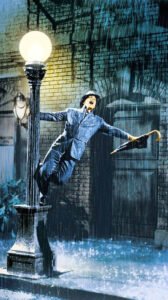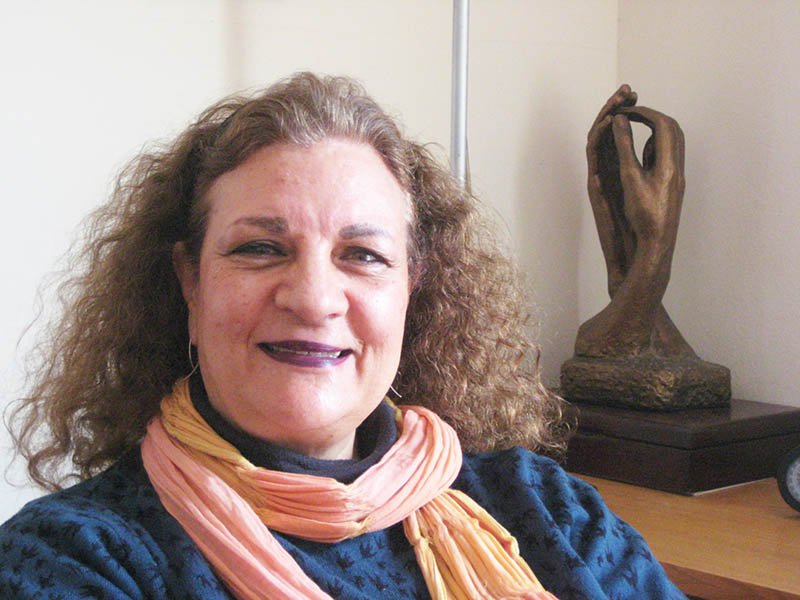In a relationship psychotherapist, THEO PANAYIDES finds a serene woman who believes in togetherness, resilience and flexibility
There’s a framed photo on the wall of the office – a film still, yellowed with age. It’s Gene Kelly in Singin’ in the Rain, the iconic image where he holds on to a lamp post with one hand while flashing a grin to the heavens: “Come on with the rain, I’ve a smile on my face!”. She took the photo away for a while, says Joanna Colocassides, but her clients (never ‘patients’) begged her to bring it back. “This is an embodiment of what the ideal therapy would look like,” she chuckles, nodding at the picture. “This is the result of ideal therapy. When you feel in touch with the delight of life.”

Gene Kelly in Singing in the Rain
Joanna is a couples and family psychotherapist (though she sees individuals as well), specifically a systemic therapist “which means I focus on relationships, that’s my quote-unquote expertise”. This is all she’s ever done, she affirms, smiling from beneath a mass of brown curly hair, or ever wanted to do; she came back to Cyprus in 1991, after eight years in New York, and opened her office soon after. The diplomas on the wall behind her attest to years of training – Psychology at Bristol University, a Master’s at NYU, further studies at Queen’s College (part of CUNY) and the Ackerman Institute for the Family – but diplomas were never the point, indeed she chose not to do a PhD because it was “very academic”. She’s all about the clients, and the various relationships – the bonds between parents and children, husbands and wives, and indeed therapist and client.
Is that last one even appropriate? Aren’t therapists supposed to be detached and impartial, godlike experts handing down judgment and counsel? “Yeah, but what does that mean? Can you really be detached? I don’t think so.” As she gets older, says Joanna, she increasingly feels like “there’s a connection between me and my clients, and there’s a caring as well”.
There are limits, of course. You don’t go out for a beer with clients; even phone calls outside office hours are discouraged. But things have changed in the world of therapy in the past few decades; research has shown that, when clients self-report on successful therapy, the common refrain is “‘I felt my therapist cared for me’, or something to that effect. So the field itself had to face the fact that it’s the relationship that counts, not the techniques that you use… I think the important word is ‘authentic’,” she adds thoughtfully. “It’s more important to be authentic with people. And it’s hard not to care for people when they talk about the things that are important to them. And they share their pain. People come here and share their pain.”
She’s seen (and heard) a lot; like a doctor, she sees people at their worst, or at least most vulnerable – but a doctor merely treats ill-health, whereas her clients come disfigured by the ravages of pain, and guilt, and fear, and self-loathing. “We made a home visit once with my boss in Astoria,” she recalls, thinking back to her time in New York, “and we met this miserable poor woman who had to answer questions like ‘What about those bruises on your son?’ ‘Well, he fell down the stairs’ – and you could tell she was so afraid to tell us what the real story was.” (The boy was being abused by his father, of course.) Things are less intense in Cyprus, just because people aren’t so isolated – but bad stuff happens everywhere, that goes without saying. Many of her clients deal with everyday modern-day ailments like anxiety and depression, but for instance she’s also had couples whose emotional lives are being blighted by some sexual violation from the past, trying to pinpoint that trauma and talk about it.
What kind of person plunges into such work, and stays there for life? (Joanna was about 16 when she decided to become a psychotherapist; she’ll be 60 this year.) I assumed her own family – the one she grew up in – provided some impetus, but her childhood seems to have been unexceptional, the middle child (and only girl) in a middle-class household. The set-up was patriarchal, as in most Cypriot families at the time, not especially conducive to talking about feelings – but still, she confirms, “a good family, a good upbringing”. Her own close relationships seem equally stable. She’s been married to the same man for 34 years (her husband is a Greek-American businessman; they met in New York) and they have two kids, a daughter and son, now in their 20s. There don’t appear to be any major crises or personal demons she’s trying to resolve or exorcise by being a therapist – though of course she’s had bumps in the road, “everyone does”.
Maybe that photo of Gene Kelly is relevant here. After all, it’s not a natural adornment for a therapist’s wall; the science of psychotherapy is designed to make you self-aware, not necessarily exuberant and singin’ in the rain. But Joanna, as she said, is all about relationships – and a relationship is inherently a joyful business, a bond, a connection, a case of something where before there was nothing. Her approach seems naturally buoyant, driven as she says by “a faith in people”. Hasn’t it made her cynical, seeing so much sadness and alienation year after year, so many damaged couples and broken families? She shakes her head: “But you also see the beautiful things”.
She believes in togetherness. She believes in resilience. She believes (like Gene Kelly) in joy. She believes – as a family therapist should, after all – in family. She’ll very seldom see kids or teenagers on their own, only with their parents, her focus being on “helping the parents figure out ways to approach, befriend and get close to their children”. The point isn’t for parents to outsource the solution of their children’s problems to an ‘expert’; only they, the parents, are best placed to solve them. (Like she says, it’s about the relationship.) She herself always planned to leave New York, she tells me, because it wasn’t great for raising kids. But it’s so exciting, I protest, the city that never sleeps and so on. “Well, yeah – but it’s tiring, if it never sleeps,” she replies mildly.
She comes off as a mild person generally: not quiet or timid, not at all – but mellow, sensible, domesticated. She deals with so much anger in her job, I note; how does she deal with her own anger? “I breathe!” she replies with a chuckle, taking deep breaths by way of illustration. “It helps you bring the decibel level down, then your brain clarifies and you can start seeing what the options are.” (It’s also a useful delaying tactic: you should always try not to respond immediately when angry, “because the first thing that comes out of your mouth is usually something you’ll regret”.) Bringing the decibel level down seems to be her m.o. in general. I don’t really know how therapists operate – but it’s easy to imagine Joanna taking the sting out of toxic situations with an equable manner and sweet common sense, pouring oil on troubled waters like a peacemaking mum telling everyone to calm down and be friends.
Her solutions are bland, almost hackneyed. “It’s always good if we can see a crisis as an opportunity,” she says, “and ask ourselves: ‘What can I learn from this?’… Part of my values is having faith in people’s ability to be better, to change” She believes in dialogue, mutual respect, being open and “mindful” (though the latter has become a bit cliché, she admits). “I believe in being flexible. It’s important to have beliefs, but to be open at the same time – not to be dogmatic about things.” I wondered how a therapist deals with the constant parade of unhappiness that comes through their doors – but the answer, it seems, is to meet it with a kind of serene simplicity, a faith that the most intractable problems can be solved by simple, straightforward things like talking and listening.

A cake made for her daughter’s birthday
Think of Gene Kelly again, that sense of problems made weightless. If it’s raining, get wet. Come on with the rain, I’ve a smile on my face. “The delight of life,” as Joanna put it. What makes her happiest? She thinks for a moment: “Connecting with people makes me happy. Making things also makes me happy”. She has an artistic streak, expressed – appropriately – in a tactile, practical way. She’s done decoupage (a kind of painting) and quilting, and has got into ceramics in the past couple of years. She also bakes elaborate 3D cakes: an owl for her goddaughter’s eighth birthday, a green beret for her soldier nephew, a burger with fries for her daughter’s 20th. And she also sings in a choir, a perfect metaphor for the harmony she tries to inspire – though of course that’s been paused now, with Covid.
Ah yes, Covid. The past year, I suspect, has been quite a busy time for family therapists – yet in fact she’s surprisingly positive, even on that. (“Seeing the positive” is also part of her values.) Lockdown has increased isolation, of course – yet it’s also brought many families closer, not least in breaking up the soul-crushing round of ferrying kids from one private lesson to another all day. (“A lot of parenting happens in cars these days. That makes me sad.”) Yes, connection has been lost in the sense of physical contact – “I miss hugs,” she sighs – yet “I also have a voice in my head that says it’s okay if we don’t keep up the connection for this phase, it’ll come back. It’s not lost, it’ll come back”. Won’t the pandemic leave scars? People are resilient, she says reassuringly. Some may indeed find it hard to get back to normal, all in all however “we’re all going to be happy to resume our life, and be able to leave this behind”.
Is there a touch of the Pollyanna to Joanna Colocassidou? Not necessarily. One does have to work at solving problems, after all, it doesn’t just happen by itself (all her clients are doing the work, just by going to a therapist). I suppose it’s a question of faith, like she says, reinforced by 30 years of seeing people learning to adjust to each other and often – not always, but often – breathing new life into a seemingly doomed relationship.
The family is our most important social unit – yet it’s so inefficient, when you think about it. First we expect two people to stay together for life, even though they meet when they’re young and grow – inevitably – into very different people. Then we give them a bunch of smaller people and shove them all together in close proximity, ensuring that they all become adept at pushing each other’s buttons and getting under each other’s skin. Joanna laughs at my description: “Well, it’s strange, yes”. The whole idea of a soulmate is very new – marriage used to be a purely economic arrangement, “the families were connecting rather than two people” – and of course people change, she and her husband have changed. But there’s also a much-increased comfort zone as couples mature, “you know where to say ‘OK, I’m not going to get into this again. We agree to disagree, that’s fine’. You have less energy to spend fighting and arguing with the other person”. And of course there’s love, if you’re lucky.
And what if there isn’t? Keep talking, she counsels; the opposite of love isn’t hate, it’s indifference. But the Gene Kelly Lesson involves something else too, the process of accepting the rain (another person’s flaws) as something beyond our control, not necessarily singing – we can’t all be singers – but keeping that smile on our face. Sometimes, of course, it’s unworkable; Joanna certainly isn’t against couples splitting up when things become toxic. (Rain is fine, but you don’t want to catch pneumonia.) But the lesson is also that total control is impossible: you can’t change others, she warns – spouse, kids, whatever – “you can only change yourself. Period”.
That’s the lesson in her work as a therapist too: you try to help, and do get emotionally involved (how can you not?), but other people’s lives are their own. “I like the word ‘ally’,” smiles Joanna. “I like feeling that my clients know I’m a good ally for them.” The ultimate goal is for clients to become their own ally, to shed “the voice inside telling you how horrible you are”, to bond with their kids and reconnect with their partners – and sometimes that happens, and it’s wonderful. Mostly, however, you do what you can. “We can only do our best,” she offers humbly. “As parents, and as therapists, and as people.” Serene simplicity, indeed.







Click here to change your cookie preferences